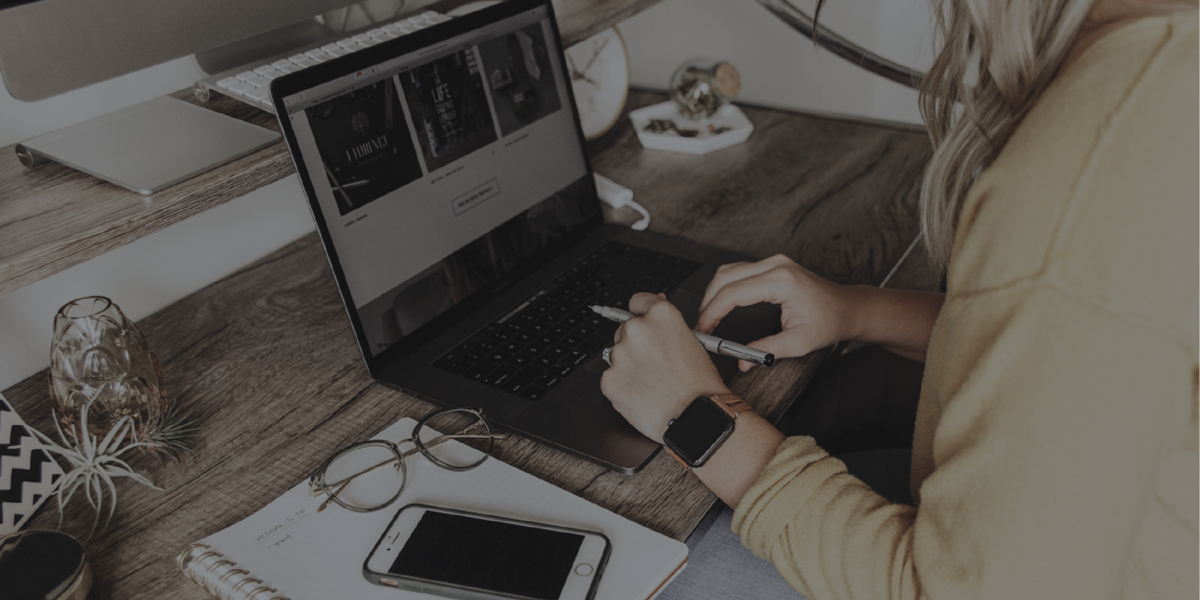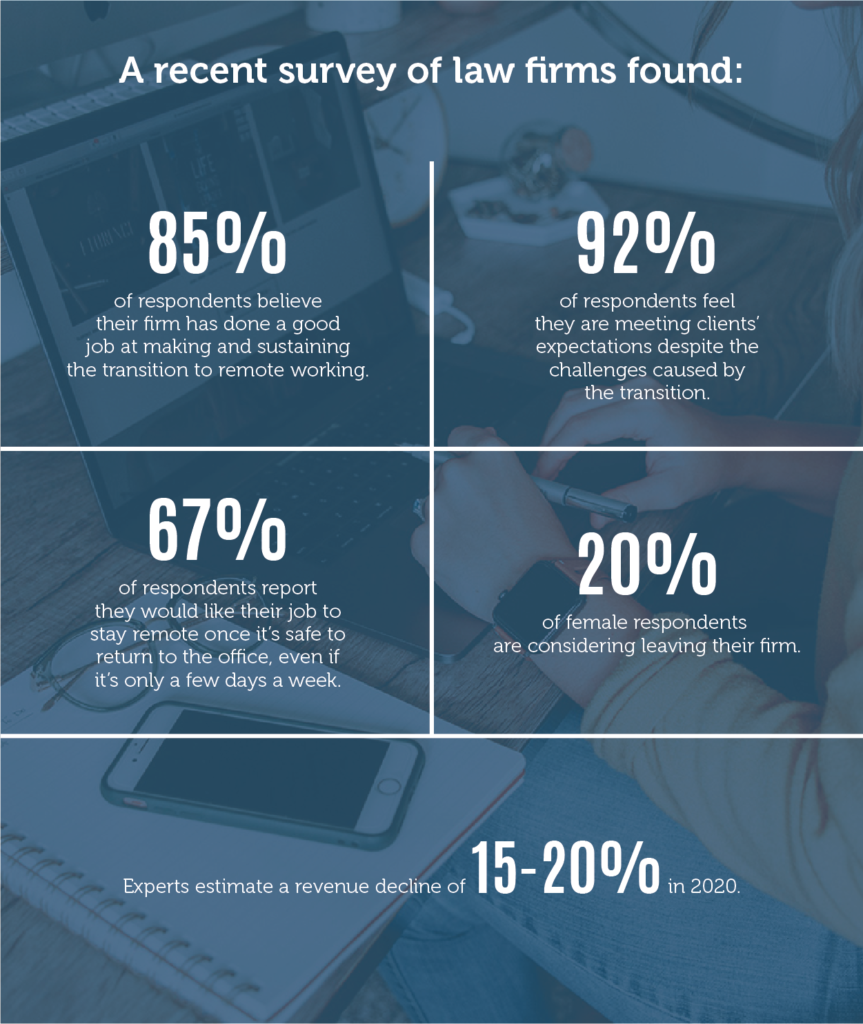Two lawyers in California discuss the challenges of remote work on the legal field and the aspects they hope stay long after the quarantine.
Working from home can mean a variety of things depending on one’s career, employer, and type of work. Quarantine and shelter in place resulting from the coronavirus brought many Americans into a similar experience, but the way we worked—or didn’t work—was different for everyone. From essential workers who keep our hospitals and grocery stores open, to those laid off or furloughed, to industries that had never really explored remote working capabilities—we all transitioned. The legal field was no different.
While technology has changed the legal field over the past few years through automation and other new capabilities, little progress was made to truly practicing remotely. However, with COVID-19, many were left with no choice but to make the transition quickly. We spoke to two attorneys who have been practicing successfully through this transition to see what have been the biggest challenges and greatest wins in their law practices.
Lauren Nicholson, class of 2017 valedictorian, attorney at law, Nicholson Law:
I opened my own office in January 2020. I was about to bring on a legal assistant when everything closed. So since I never hired anyone, I have been the only person physically working in my office and was able to quarantine while still working there.
The more difficult aspect is communicating with clients. Many of my clients have also been working from home, and it’s been a struggle for most of them to find a time they can have a private meeting or Zoom without interruption, especially when we need to discuss sensitive matters. I have had client meetings where I see the client sitting in a closet or a car just to ensure that they have privacy during the meeting.
Damon Jenkins, COL criminal law professor and public defender, Ventura County Public Defender’s Office:
 Damon Jenkins, COL criminal law professor and public defender, Ventura County Public Defender’s Office:
Damon Jenkins, COL criminal law professor and public defender, Ventura County Public Defender’s Office:
Like every other employee in any other field, maintaining focus is always a challenge when you are home and housework, chores, family, kids, and pets all distract you from work. It is also harder to stay motivated to work when your co-workers and staff aren’t there to help support you, your boss is further away, and many deadlines are extended. The benefits are that I’m able to work much more efficiently. I save hours a day by not commuting to work and waiting in line in court. I am also relying on email and text to communicate with clients, which is more effective
How has the courtroom adjusted?
LN: Things have changed drastically in the courtroom. Some courtrooms are doing hearings by Zoom, but many aren’t capable of that yet. As a practical matter, the court has done everything it can to limit the amount of people in the courtroom. And as a result, judges often require clients to wait outside, and only attorneys can be inside of the courtroom. So some clients are missing the very valuable experience of hearing rulings and reasoning directly from judicial officers.
Things have changed drastically in the courtroom. Some courtrooms are doing hearings by Zoom, but many aren’t capable of that yet.
DJ: The Ventura County Courthouse quickly adjusted to using Zoom court hearings when possible. Our managers quickly implemented safety protocols for both the office and the courtroom. The court was also flexible in allowing attorneys to appear for their clients if the client wanted to waive their presence.
Do you think concerns about privacy are valid?
DJ: Not really, at least in my case, I can easily isolate from my family. Our in-custody clients are able to video conference with us, and since it is remote there is less of a security concern and therefore less deputy presence and increased confidentiality. The jails have been great with connecting their facilities with Zoom capabilities in a private setting to protect confidentially.
LN: Absolutely. Most offices have had to institute some sort of remote access to their servers. My server is online, so I have been able to access my files from anywhere. But I also have to ensure that everything is protected and that no one can improperly access my files. I have also had to do meetings via Zoom, and in addition to concerns about people dropping into the stream (which can be somewhat alleviated by using passwords), I have to make sure that my clients are truly alone wherever they are when they take meetings.
How have your practical skills and client interactions changed, if at all?
LN: It’s not uncommon for a client to express discomfort with technology, so I’ve done everything I can to accommodate everyone. Sometimes that means switching to platforms they are more comfortable with (for example, using FaceTime instead of Zoom), or permitting them to mail me large packets and signatures rather than transmitting that information electronically. But I also offer telephone consultations and services, so even those who don’t have reliable internet and computers are still able to conduct business.
Another perk is I can share my screen during zoom meetings if I want to use legal software, and the client can see my screen in real time. I also use online services to transmit large pieces of information and collect signatures and payments, if the client is comfortable with that.
DJ: I think everyone recognizes the times we are in and realizes we need to adapt to stay safe while at the same time conduct business. The legal process and court hearings slowed for a while but are speeding back up now. Because many of our clients are in-custody, technology accessibility isn’t an issue. At this point, defendants are allowed into the court, so they never “need” a reliable internet connection. We can still meet with our clients over the phone or outside if it is possible to socially distance while still maintaining confidentiality.
Finally, what aspects of remote working do you think will continue after regulations are lifted?
LN: This has forced us to get creative and explore new services and practices, and a lot of them have turned into significant time savers. For example, Zoom depositions have allowed us to depose witnesses in other cities or areas without having to drive for hours to be physically present. That saves clients thousands of dollars in travel time, and it saves attorneys hours of driving. I’m sure there will be some kinks to work out, but it’s a step in the right direction.
Good technology inherently makes us more efficient, so I would embrace long-term changes in regards to working remotely, using Zoom court for limited court functions (excluding jury trials) and changing the way in which we communicate with clients.
DJ: Good technology inherently makes us more efficient, so I would embrace long-term changes in regards to working remotely, using Zoom court for limited court functions (excluding jury trials) and changing the way in which we communicate with clients. However, the legal field often resists change, so while I am hopeful, I am not convinced long-term changes will be adopted.



